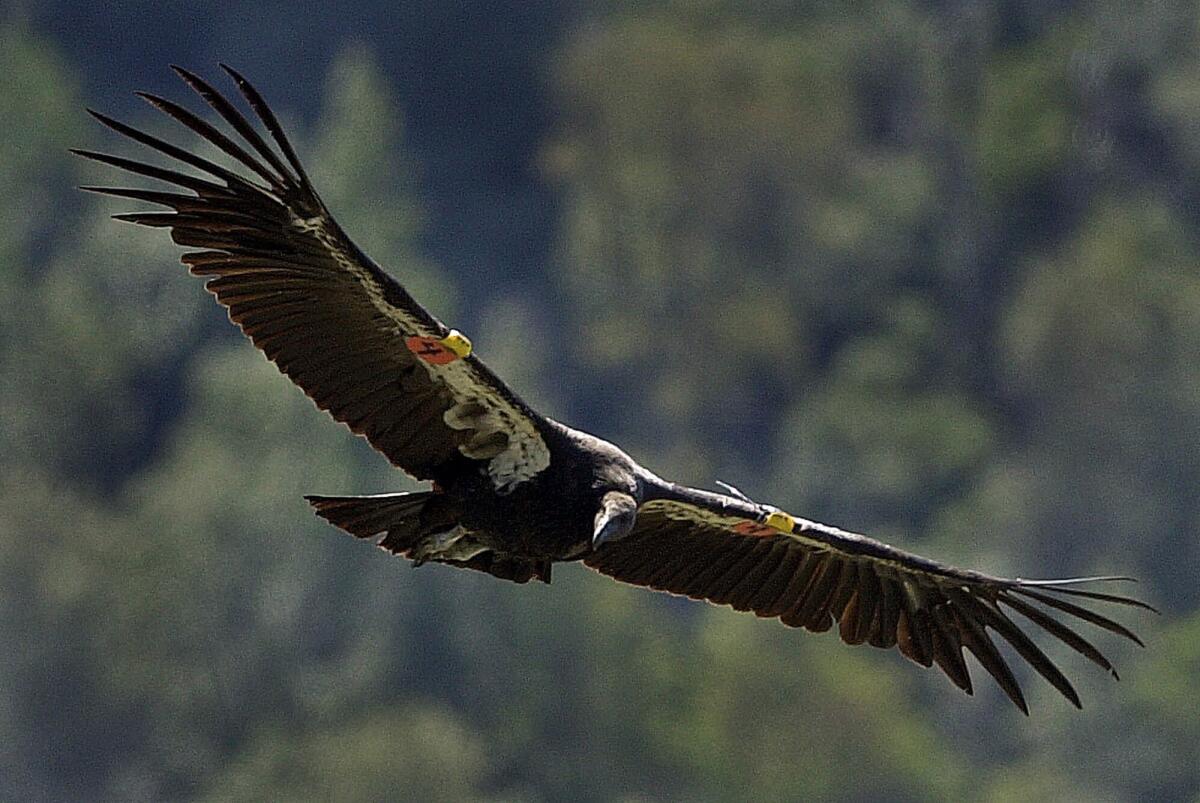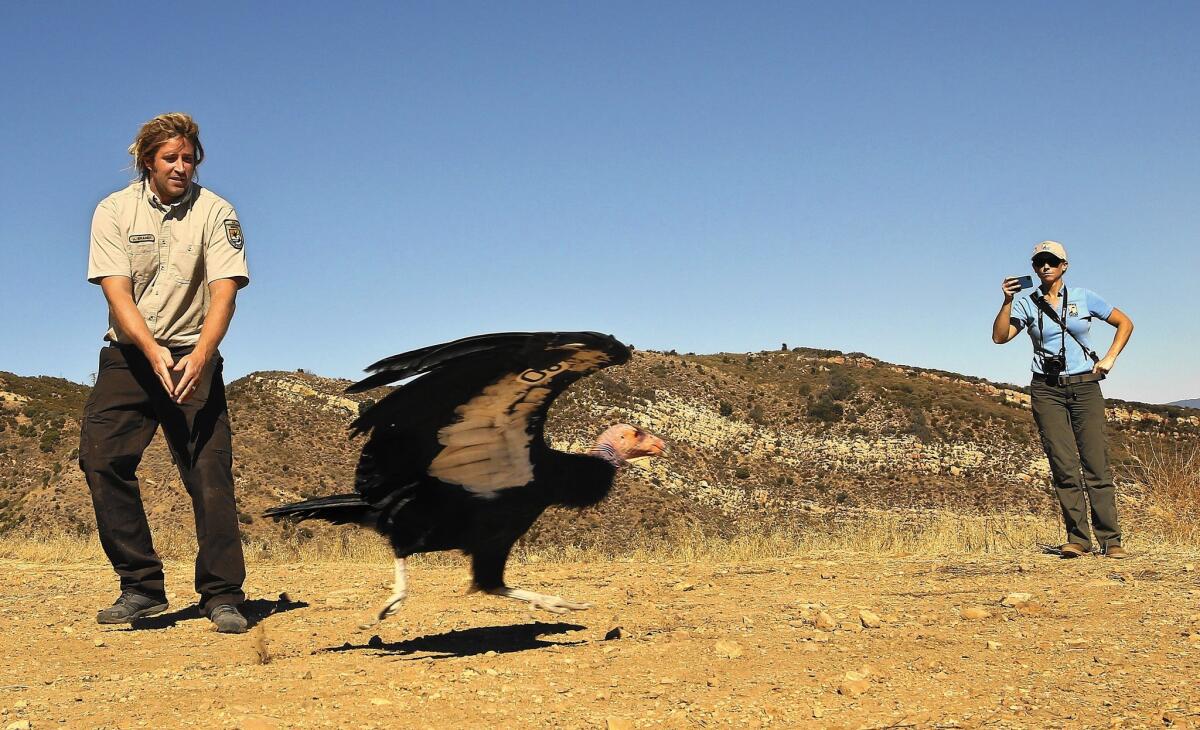How the California condor returned from the brink of extinction

Good morning, and welcome to the Essential California newsletter. It’s Wednesday, July 24, and I’m writing from Los Angeles.
Get the Essential California newsletter »
California condors are massive, primordial creatures. The birds have remained relatively unchanged since the Pleistocene Age, surviving long after the mastodons whose carcasses they once fed upon had been relegated to museum exhibits.
Mighty condors once circled the abyss of extinction. But this month, officials are celebrating a once unthinkable milestone: the birth of the 1,000th California condor chick since a massive recovery program was undertaken more than three decades ago.
The condor recovery program is now largely the topic of rosy headlines touting the new chicks, but that wasn’t always the case. Once it was radical.
When it first unspooled in the late 1970s and early ‘80s, the last-ditch effort to save the condors generated more than enough drama to populate a prestige miniseries, complete with schisms that roiled the environmental community, expensive zoo rivalries and lingering lawsuits.
“For as long as people — humans — were thought to have hunted and foraged in North America, the condors have been there the whole time and before,” Chris Parish, the director of global conservation at the Peregrine Fund, explained. But their numbers had dwindled to roughly a hundred by the turn of the last century and plummeted even further amid the rapid postwar development of the 1950s. The condor was placed on the federal endangered species list in 1967. By the early 1980s, the great birds were at the gates of oblivion, with the last of their kind slowly dying out by the tens in Los Padres National Forest.
The recovery proposal, which first made waves in 1976, necessitated capturing the birds in the wild, where they had been for tens of thousands of years, and then attempting to breed them in captivity in zoos. They would then eventually be returned to their California habitats, but only if the efforts were successful. Many had their doubts about whether gargantuan birds bred in zoos could ever successfully re-adapt to the wild.
There were people — powerful conservationists and wilderness activists — who would rather see the mighty condor go extinct than be relegated to zoos, even temporarily. Internecine warfare was waged in the ecological community, as groups took sides over whether we humans should interfere with the slow march of natural selection.
Of course, the birds were more than just birds. They were rife with symbolism. And the forfeiting of their wildness was unthinkable to many. That the federal government and private groups planned to play God through a risky, untested program only added insult to injury.

David Brower, an environmentalist who was pivotal in some of the largest conservation victories of the 20th century, argued that creating “synthetic” environments where condors would be dependent on their human breeders would constitute “a kind of immorality.”
The dispute was dramatic and bitter, but after “years of verbal battles and jurisdictional disputes — between state and federal wildlife officials, Los Angeles and San Diego Zoo officials, environmentalists and government biologists” as our coverage put it at the time, a trapping program finally began in the mountain wilds north and east of Los Angeles in 1983. At the time, there were just 22 condors left.
The last wild California condor was captured in April 1987. The next year heralded the arrival of the very first condor to be conceived and hatched in captivity. It was referred to as the “$20-million baby,” since that’s what the program had cost by then.
The first birds were released from captivity in 1992. It took them several hours to take flight.
The living condor population has now risen above 500, with more than half of those birds successfully living free in the wild in parts of California, Utah, Arizona and northern Mexico.
“The potential recovery of the condor gives me greater hope,” Chris Parish, the conservation director who had worked on the program, said. “Not just for the bird itself, but for society — in our ability to identify when there’s a problem, identify what the problem is and then work to fix that problem.”
“Our success in doing that time and time again is what gives me hope,” Parish continued. “And that’s what I see when I see the condor flying out there.”
And now, here’s what’s happening across California:
TOP STORIES
In 2016, California implemented one of the strictest immunization laws in the country, requiring that all children be up to date on their vaccinations to attend school unless a doctor says otherwise. The law, however, does not apply to children who are home-schooled, a loophole that parents seem to be increasingly exploiting. Over the past three years, the number of kindergartners who were home-schooled and did not have their shots quadrupled, according to a Times analysis of state data. Los Angeles Times
The Los Angeles Department of Water and Power’s top executive stepped down Tuesday, one day after FBI agents raided the utility’s downtown headquarters. Mayor Eric Garcetti had announced weeks ago that the DWP’s general manager would be leaving the utility in the fall, but his departure is now immediate. Los Angeles Times
L.A. STORIES
Angelenos have long dreamed of a transit line through the Sepulveda Pass, often while stuck in soul-crushing traffic on the 405. But bringing the holy grail of L.A. transit projects to fruition could cost more than $13 billion, a figure significantly higher than previous estimates. Los Angeles Times
Hollywood companies are cutting ties with powerhouse publicist Peggy Siegal because of the role she played in helping accused child sex trafficker Jeffrey Epstein get into splashy premieres and parties. Variety
Upscale NYC grocery chain Dean & Deluca will no longer be opening in L.A., as had previously been announced. Eater LA
Dodger Stadium will undergo a $100-million renovation this offseason. Spread over two acres, a new center-field plaza will include food establishments, a beer garden, two sports bars, a children’s play area and a space for live pregame and postgame music. Los Angeles Times
Javier Cabral has been named the new editor of L.A. Taco, succeeding departing editor Daniel Hernandez. Hernandez built the scrappy site into a vital player in L.A.’s dwindling indie media scene during his nearly two-year tenure. L.A. Taco
Your support helps us deliver the news that matters most. Subscribe to the Los Angeles Times.
IMMIGRATION AND THE BORDER
An immigration sweep targeting thousands of people nationwide resulted in only 35 arrests, Immigration and Customs Enforcement said Tuesday. Los Angeles Times
San Diego representatives want $2 billion to help stop cross-border sewage flows. The problem has been an issue for decades and often leads to beach closures in San Diego County as sewage-contaminated runoff in the Tijuana River flows into Pacific Ocean. San Diego Union-Tribune
POLITICS AND GOVERNMENT
Gov. Gavin Newsom announced a shakeup of the state Department of Motor Vehicles, appointing its third director in a year and backing an overhaul of the agency’s practices in response to widespread public complaints of poor service. While discussing the changes, the governor said that the DMV needs to be more “like an Apple store experience,” making it clear — as a colleague of mine noted on Twitter — that governor has likely never experienced the unique desperation of showing up to the Apple store without an appointment. Los Angeles Times
Democrats are perplexed by billionaire environmentalist Tom Steyer’s eleventh-hour entrance into the already crowded field of 2020 challengers. Politico
CRIME AND COURTS
The L.A. County sheriff’s watchdog could gain subpoena power for investigating deputy gangs. Los Angeles Times
Google has settled a long-running age-discrimination class-action lawsuit with more than 200 workers for $11 million. East Bay Times
HEALTH AND THE ENVIRONMENT
Peak fire season is near, and the federal government is short hundreds of firefighters. Los Angeles Times
Crude oil and water continue to flow from a Chevron well site in Kern County in one of the largest California oil spills in decades. Nearly a million gallons of fluid have flowed to the surface in an oil field about 35 miles west of Bakersfield since the leak began in May. KQED
Fewer children are drowning in California as communities tighten their building codes. Sacramento Bee
How one California biologist repopulated a rare butterfly species in his backyard. Vox
CALIFORNIA CULTURE
From the annals of inexplicability: A pristine In-N-Out burger somehow appeared on the ground in Queens, at least 1,500 miles from the nearest outpost of the beloved West Coast burger chain. New York Post
How a scheming Golden State Warriors fan was able to sneak his way into sitting courtside for nearly 30 home games this past season. Mercury News
The city of Modesto is considering a request for a permit for a “straight pride festival,” fliers for which have been circulating on social media. The Central Valley city is less than 90 miles east (and a cultural universe away) from San Francisco. CBS Sacramento
In the market for some vintage wine-making equipment, or a row of rusted mid-century pickup trucks? A 153-year-old Sonoma winery is having an estate sale this weekend. Estatesales.org
The annual Night Market has returned to Orange County’s Little Saigon. The outdoor market will run weekends through Sept. 1 at the Asian Garden Mall in Westminster. Orange County Register
Here’s where the chief marketing officer for Sacramento’s tourism agency takes out-of-towners when they visit her in the state capital. Sacramento Magazine
CALIFORNIA ALMANAC
Los Angeles: partly sunny, 90. San Diego: partly sunny, 81. San Francisco: sunny, 70. San Jose: sunny, 87. Sacramento: sunny, 100. More weather is here.
AND FINALLY
Every night at the end of America / We taste our wine, looking at the Pacific. / How sad it is, the end of America!
— poet Louis Simpson, “Lines Written Near San Francisco” (1963)
If you have a memory or story about the Golden State, share it with us. (Please keep your story to 100 words.)
Please let us know what we can do to make this newsletter more useful to you. Send comments, complaints, ideas and unrelated book recommendations to Julia Wick. Follow her on Twitter @Sherlyholmes.
More to Read
Sign up for Essential California
The most important California stories and recommendations in your inbox every morning.
You may occasionally receive promotional content from the Los Angeles Times.











